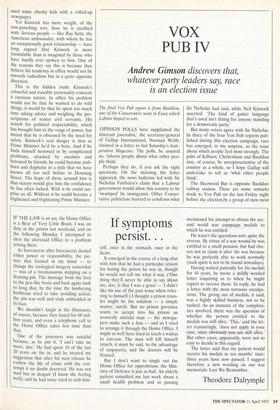If symptoms persist. .
IF THE LAW is an ass, the Home Office is a Bear of Very Little Brain. I was on duty at the prison last weekend, and on the following Monday I attempted to alert the aforesaid Office to a problem arising there.
As bureaucrat after bureaucrat denied either power or responsibility, the pic- ture that formed in my mind — to change the zoological imagery somewhat — was of a brontosaurus stepping on a drawing-pin. The message from the foot to the pea-like brain and back again took so long that, by the time the lumbering herbivore tried to take avoiding action, the pin was well and truly embedded in its foot.
We shouldn't laugh at the dinosaurs, of course, because they lasted for 60 mil- lion years, and even a telephone call to the Home Office takes less time than that.
One of the prisoners was suicidal because, as he put it, 'I can't take no more, doc.' He had spent 18 of the last 20 years on the in, and he treated my suggestion that after his next release he eschew the life of crime with the con- tempt it no doubt deserved. He was not mad but in despair (I know the feeling well); and he had twice tried to stab him- self, once in the stomach, once in the heart.
It emerged in the course of a long chat with him that he had a particular reason for hating the prison he was in, though he would not tell me what it was. ('One thing they'll never be able to say about me, doc, is that I was a grass' — I didn't like his use of the past tense when refer- ring to himself.) I thought a prison trans- fer might be the solution — a simple matter, surely. But no prison governor wants to accept into his prison an avowedly suicidal man — the newspa- pers make such a fuss — and so I tried to arrange it through the Home Office. I might as well have flied to teach a walrus to can-can. The man will kill himself (much, it must be said, to the advantage of taxpayers), and the doctors will be blamed.
But I don't want to single out the Home Office for opprobrium: the Min- istry of Defence is just as bad. An elderly patient consulted me last week about a small health problem and in passing mentioned his attempt to obtain the sec- ond world war campaign medals to which he was entitled.
He wasn't the querulous sort, quite the reverse. By virtue of a war wound he was entitled to a small pension, but had cho- sen not to claim it after the war because he was perfectly able to work normally (such spirit is not to be found nowadays).
Having waited patiently for his medals for 44 years, he wrote a mildly worded letter enquiring as to when he might expect to receive them. In reply, he had a letter with the most tortuous exculpa- tions. The giving out of medals, it said, was a highly skilled business, not to be rushed. As an instance of the complexi- ties involved, there was the question of whether the person entitled to the medals was still alive. 'This,' said the let- ter reassuringly, 'does not apply in your case, since obviously you are still alive.' But other cases, apparently, were not so easy to decide in this regard.
The letter said that my patient would receive his medals in ten months' time: three years have now passed. I suggest therefore a new wording on our war memorials: Lest We Remember.
Theodore Dalrymple


















































 Previous page
Previous page